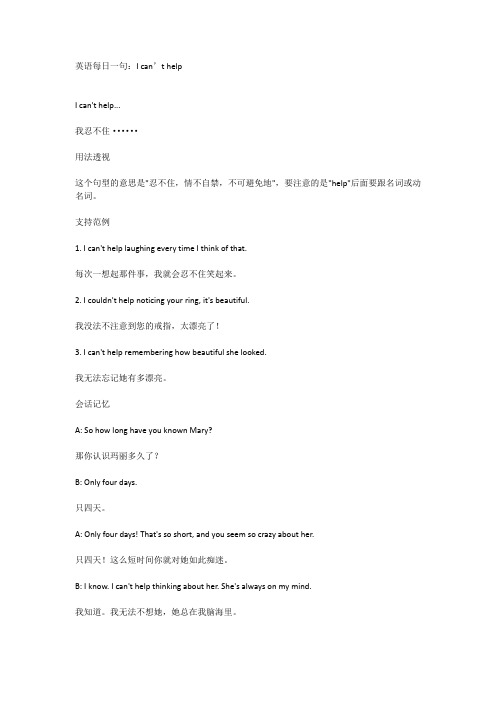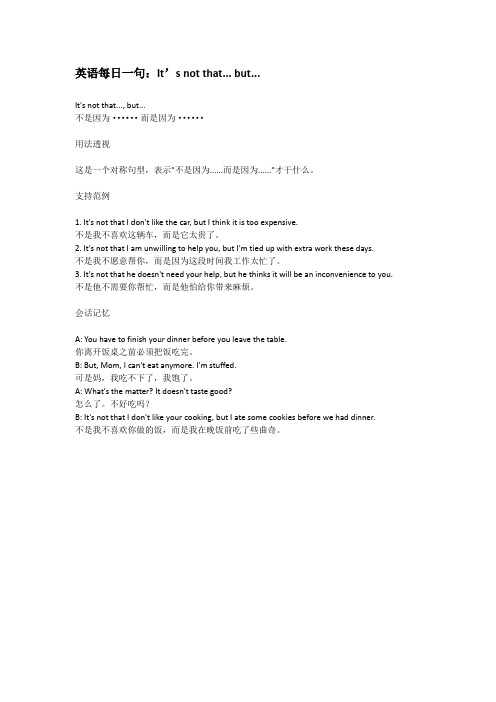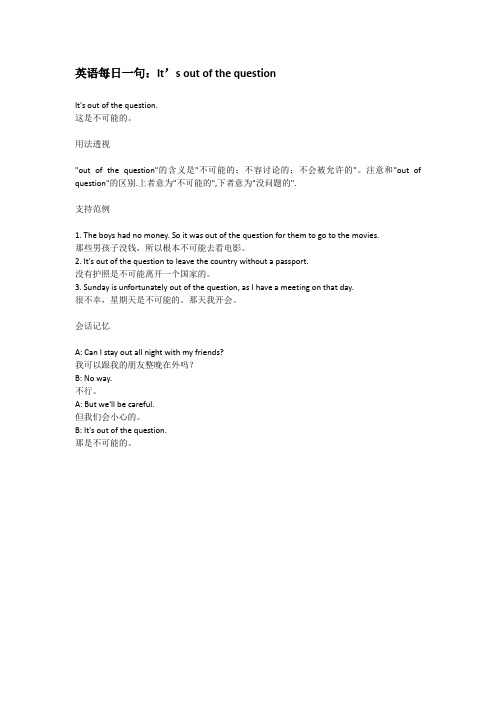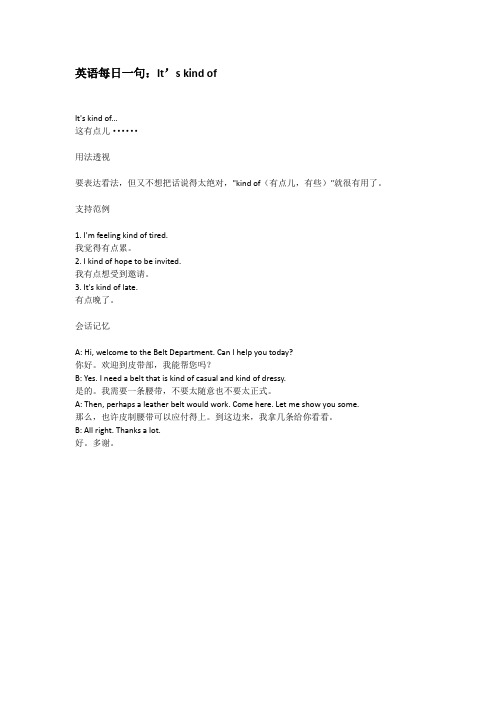昂立老师教你英语每日一句:I’d hate for you to...
昂立学生学习英语每日一句:I can’t help

英语每日一句:I can’t help
I can't help...
我忍不住······
用法透视
这个句型的意思是"忍不住,情不自禁,不可避免地",要注意的是"help"后面要跟名词或动名词。
支持范例
1. I can't help laughing every time I think of that.
每次一想起那件事,我就会忍不住笑起来。
2. I couldn't help noticing your ring, it's beautiful.
我没法不注意到您的戒指,太漂亮了!
3. I can't help remembering how beautiful she looked.
我无法忘记她有多漂亮。
会话记忆
A: So how long have you known Mary?
那你认识玛丽多久了?
B: Only four days.
只四天。
A: Only four days! That's so short, and you seem so crazy about her.
只四天!这么短时间你就对她如此痴迷。
B: I know. I can't help thinking about her. She's always on my mind.
我知道。
我无法不想她,她总在我脑海里。
昂立老师教你英语每日一句:It’s not that... but...

英语每日一句:It’s not that... but...It's not that..., but...不是因为······而是因为······用法透视这是一个对称句型,表示"不是因为......而是因为......"才干什么。
支持范例1. It's not that I don't like the car, but I think it is too expensive.不是我不喜欢这辆车,而是它太贵了。
2. It's not that I am unwilling to help you, but I'm tied up with extra work these days.不是我不愿意帮你,而是因为这段时间我工作太忙了。
3. It's not that he doesn't need your help, but he thinks it will be an inconvenience to you. 不是他不需要你帮忙,而是他怕给你带来麻烦。
会话记忆A: You have to finish your dinner before you leave the table.你离开饭桌之前必须把饭吃完。
B: But, Mom, I can't eat anymore. I'm stuffed.可是妈,我吃不下了,我饱了。
A: What's the matter? It doesn't taste good?怎么了。
不好吃吗?B: It's not that I don't like your cooking, but I ate some cookies before we had dinner.不是我不喜欢你做的饭,而是我在晚饭前吃了些曲奇。
昂立学生学习英语每日一句:I don’t see any point in

英语每日一句:I don’t see any point inI don't see any point in...我觉得没必要······用法透视这里的"point"表示"意义"。
这个句型的意思是"做......是没必要的,没意义的"。
支持范例1. I don't see any point in asking him.我认为问他也没意义。
2. There's no point in wasting time.没必要浪费时间。
3. I don't see much point in protesting.我觉得抗议也没多大意义。
会话记忆A: Why you are so crazy about Beijing Opera? It's so boring.你怎么会对京剧那么着迷呢?它太无趣了。
B: But I think it's fantastic and charming. Well, you have your opinion and I have mine.可我觉得京剧非常精彩,有魅力。
哎,你有你的观点,我有我的观点。
A: Maybe you're right. But I just still can't understand...或许你是对的,但我还是弄不懂......B: Come on. I don't see any point in arguing about this. Everyone has a right to his own opinion. 算了。
我觉得没必要为此辩论。
每个人都有权保留自己的意见。
昂立老师教你英语每日一句:It’s up to

英语每日一句:It’s up toIt's up to...由······来决定用法透视"to"后面接代词宾格或名词,表示"由......来做决定;取决于......;是......的职责"。
支持范例1. Do you want to eat a Western or Chinese meal? It's up to you.吃西餐还是中餐?由你来决定。
2. It's up to us to help those in need.我们有责任帮助那些有困难的人。
3. It's not up to you to tell me how to do my job.用不着你来告诉我怎样做我自己的工作。
会话记忆A: I'm looking forward to our son's graduation this weekend.我盼着这个周末儿子毕业呢。
B: Yes. So am I. But what will he do after graduation? He really needs to go to college. 我也是。
不过他毕业后做什么呢?他需要上大学。
A: Well, dear, we can't force him to go to college. It's up to him.可是亲爱的,我们不能强迫他上大学啊,这得由他决定。
B: I know that but he has to learn to be independent. He can't just keep living at home. 我知道,但他得学会自立,他不能老待在家里。
昂立老师教你英语每日一句:It’s out of the question

英语每日一句:It’s out of the question
It's out of the question.
这是不可能的。
用法透视
"out of the question"的含义是"不可能的;不容讨论的;不会被允许的"。
注意和"out of question"的区别.上者意为"不可能的",下者意为"没问题的".
支持范例
1. The boys had no money. So it was out of the question for them to go to the movies.
那些男孩子没钱,所以根本不可能去看电影。
2. It's out of the question to leave the country without a passport.
没有护照是不可能离开一个国家的。
3. Sunday is unfortunately out of the question, as I have a meeting on that day.
很不幸,星期天是不可能的。
那天我开会。
会话记忆
A: Can I stay out all night with my friends?
我可以跟我的朋友整晚在外吗?
B: No way.
不行。
A: But we'll be careful.
但我们会小心的。
B: It's out of the question.
那是不可能的。
讽刺人的英语句子说说心情

讽刺⼈的英语句⼦说说⼼情1. 讽刺虚伪⼈的英语句⼦2. You make me sick!你真让我恶⼼!3. What's wrong with you?你怎么回事?4.You shouldn't have done that!你真不应该那样做!5.You're a jerk!你是个废物/混球!6.Don't talk to me like that!别那样和我说话!7.Who do you think you are?你以为你是谁?8.What's your problem?你怎么回事啊?9. I hate you!我讨厌你! 10.I don't want to see your face!我不愿再见到你! 11.You're crazy!你疯了! 12.Are you insane/crazy/out of your mind?你疯了吗? 13.Don't bother me. 别烦我。
14.Knock it off. 少来这⼀套。
15.Get out of my face. 从我⾯前消失! 16.Leave me alone. ⾛开。
17. Get lost.滚开!18.Take a hike!哪⼉凉快哪⼉歇着去吧。
19.You piss me off. 你⽓死我了。
20.How dare you!你敢! 21.Cut it out. 省省吧。
22.You stupid jerk!你这蠢猪! 23.You have a lot of nerve. 脸⽪真厚。
24.Shut up!闭嘴! 25.What were you thinking?你脑⼦进⽔啊? 26.You are out of your mind. 你脑⼦有⽑病! 27. Don't give me your shit. 别跟我胡扯。
28.You're a pain in the ass. 你这讨厌⿁。
昂立老师教你英语每日一句:It’s kind of

英语每日一句:It’s kind of
It's kind of...
这有点儿······
用法透视
要表达看法,但又不想把话说得太绝对,"kind of(有点儿,有些)"就很有用了。
支持范例
1. I'm feeling kind of tired.
我觉得有点累。
2. I kind of hope to be invited.
我有点想受到邀请。
3. It's kind of late.
有点晚了。
会话记忆
A: Hi, welcome to the Belt Department. Can I help you today?
你好。
欢迎到皮带部,我能帮您吗?
B: Yes. I need a belt that is kind of casual and kind of dressy.
是的。
我需要一条腰带,不要太随意也不要太正式。
A: Then, perhaps a leather belt would work. Come here. Let me show you some.
那么,也许皮制腰带可以应付得上。
到这边来,我拿几条给你看看。
B: All right. Thanks a lot.
好。
多谢。
昂立老师教你英语每日一句:I would if I could

英语每日一句:I would if I could
I would if I could.
如果我能的话我会的。
用法透视
这是一个虚拟语气句型。
含义是"不是我不这么做,而是我没办法做"。
虚拟语气中说"如果我能的话"要用"if I could",表示事实上"I can't"。
支持范例
1. I would if I could, but I can't go with you.
如果我能的话我会的,但是我不能跟你去。
2. I would if I could, but I really have no idea.
如果我能的话我会的,但我真的不知道。
3. I would if I could, but I have to say sorry.
我不得不跟你说抱歉。
如果我能的话我一定会的。
会话记忆
A: Please switch work shifts with me.
我请你跟我换班。
B: I would if I could.
假如我能的话,我会的。
A: Why can't you?
你为什么不能?
B: Because I have other obligations.
因为我还有另外的职责。
- 1、下载文档前请自行甄别文档内容的完整性,平台不提供额外的编辑、内容补充、找答案等附加服务。
- 2、"仅部分预览"的文档,不可在线预览部分如存在完整性等问题,可反馈申请退款(可完整预览的文档不适用该条件!)。
- 3、如文档侵犯您的权益,请联系客服反馈,我们会尽快为您处理(人工客服工作时间:9:00-18:30)。
英语每日一句:I’d hate for you to
I'd hate for you to...
我不愿意你······
用法透视
这个句型的结构与"I'd like to..."相近,但含义相反。
这里"hate"不作"憎恨"解,而取"不愿意;遗憾"之意。
支持范例
1. I'd hate for you to leave our company.
我不愿意你离开我们公司。
2. I'd hate for you to miss the party.
我不愿意你错过这次晚会。
3. I'd hate for you to get sick.
我不想你生病。
会话记忆
A: Do you have the five dollars I lent you yesterday?
你带了我昨天借你的五块钱了吗?
B: Oh I forgot! I'll run home real quickly and bring you the money.
噢,我忘了。
我会很快跑回家去给你拿。
A: You don't have to go right away.
你不必现在就去。
B: I'd hate for you to think I was lazy in returning your money.
我不想你认为我懒得还你的钱。
